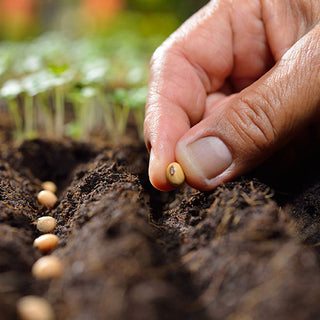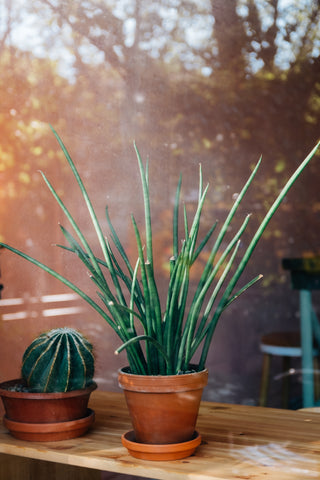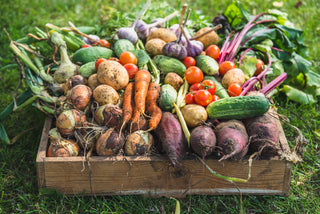Trinidad Scorpion Seedlings
- Unit price
- / per
The Trinidad Scorpion chili, with its searing heat, has gained prominence in recent years, boasting a Scoville rating exceeding 1.2 million, making it one of the hottest peppers globally. Chili enthusiasts are captivated by the challenge it presents, seeking the thrill of pushing their taste buds to the limit. Yet, despite its popularity, many find the Trinidad Scorpion chili to be an acquired taste, prompting the question of why it's embraced widely, even if not universally enjoyed.
The pepper was christened "Trinidad Scorpion Butch T" by the cultivators, in honor of Butch Taylor, the individual responsible for cultivating these chili peppers in 2011.
Understanding the allure of fiery peppers is crucial. For many, the exhilaration of consuming something intensely spicy, igniting their mouths, is part of the attraction. There's a sense of accomplishment in handling the heat, and the surge of endorphins from the experience is relished by chili enthusiasts.
The Trinidad Scorpion takes this passion to extremes, surpassing the heat levels of common peppers like jalapenos and habaneros. It has become a coveted challenge, a "Holy Grail" for chili enthusiasts who relish the bragging rights that come with conquering its formidable heat.
However, the intense heat and somewhat unpleasant flavor have led to a paradox where many people, despite the chili's popularity, don't enjoy consuming it. The overwhelming heat can be painful, and some describe the flavor as bitter or metallic, with the heat overshadowing other taste elements.
Why, then, do individuals continue to consume the Trinidad Scorpion if it's not universally enjoyable? For many, it's about the challenge itself—testing their ability to withstand the heat, with the exclusivity of being among those who can handle it adding to the allure. Some may incorporate the Trinidad Scorpion sparingly, using it to impart a fiery kick to their favorite dishes.
In summary, the Trinidad Scorpion's popularity stems from its extraordinary heat level and the challenge it poses to chili enthusiasts. Yet, its intense heat and somewhat divisive flavor mean that not everyone finds it palatable. For those up for the challenge, the Trinidad Scorpion can be a thrilling addition to culinary adventures. However, for most, it's best enjoyed sparingly, if at all.
🌶️SCOVILLE SCALE
- Mild (100 to 2,500)
- Medium (2,500 to 30,000)
- Hot (30,000 to 100,000)
- Extra Hot (100,000 to 300,000)
- Extremely Hot (above 300,000)
- TRINIDAD SCORPION (above 1,200,000)
Trinidad Scorpion plants are small bushes, typically reaching a height of about 0.9-1.2 meters (3-4 feet) tall. Fully grown, they exhibit a bushy, spreading habit with a similar width.
The leaves of the Trinidad Scorpion plant are medium green and oval-shaped with pointed tips, growing alternately along the stems and possessing a slightly fuzzy texture.
The flowers of the Trinidad Scorpion plant are small appearing in clusters and being self-pollinating, eliminating the need for cross-pollination from another plant.
As the flowers mature, they transform into small green pods, eventually ripening into the signature bright red Trinidad Scorpion peppers. These peppers are typically 2.5-5 centimeters (1-2 inches) long, showcasing a distinctive wrinkled, bumpy texture.
A fully grown Trinidad Scorpion plant can yield dozens, if not hundreds, of peppers throughout the growing season, spanning from mid-summer to early fall. However, cultivating Trinidad Scorpions can be challenging, requiring a lengthy growing season, ample sunlight, and consistent watering and fertilization for a bountiful harvest.
Despite the challenges, many chili enthusiasts find growing their own Trinidad Scorpion plants to be a rewarding experience.
We are a proudly Australian-owned family business dedicated to providing high-quality seedlings, seeds, fruit trees, native plants, and indoor ornamentals. We offer express shipping to SA, VIC, QLD, and NSW, with local delivery and pickups available by arrangement. Unfortunately, due to restrictions, we are unable to send to TAS, WA, or NT. For OH&S and biosecurity reasons, farm tours and direct purchases are not available, and pickups can only be made at our farm gate entrance. We deeply value our loyal customers and thank you for your continued support.
Trinidad Scorpion Seedlings
- Unit price
- / per
Adding product to your cart
You may also like
The Trinidad Scorpion chili, with its searing heat, has gained prominence in recent years, boasting a Scoville rating exceeding 1.2 million, making it one of the hottest peppers globally. Chili enthusiasts are captivated by the challenge it presents, seeking the thrill of pushing their taste buds to the limit. Yet, despite its popularity, many find the Trinidad Scorpion chili to be an acquired taste, prompting the question of why it's embraced widely, even if not universally enjoyed.
The pepper was christened "Trinidad Scorpion Butch T" by the cultivators, in honor of Butch Taylor, the individual responsible for cultivating these chili peppers in 2011.
Understanding the allure of fiery peppers is crucial. For many, the exhilaration of consuming something intensely spicy, igniting their mouths, is part of the attraction. There's a sense of accomplishment in handling the heat, and the surge of endorphins from the experience is relished by chili enthusiasts.
The Trinidad Scorpion takes this passion to extremes, surpassing the heat levels of common peppers like jalapenos and habaneros. It has become a coveted challenge, a "Holy Grail" for chili enthusiasts who relish the bragging rights that come with conquering its formidable heat.
However, the intense heat and somewhat unpleasant flavor have led to a paradox where many people, despite the chili's popularity, don't enjoy consuming it. The overwhelming heat can be painful, and some describe the flavor as bitter or metallic, with the heat overshadowing other taste elements.
Why, then, do individuals continue to consume the Trinidad Scorpion if it's not universally enjoyable? For many, it's about the challenge itself—testing their ability to withstand the heat, with the exclusivity of being among those who can handle it adding to the allure. Some may incorporate the Trinidad Scorpion sparingly, using it to impart a fiery kick to their favorite dishes.
In summary, the Trinidad Scorpion's popularity stems from its extraordinary heat level and the challenge it poses to chili enthusiasts. Yet, its intense heat and somewhat divisive flavor mean that not everyone finds it palatable. For those up for the challenge, the Trinidad Scorpion can be a thrilling addition to culinary adventures. However, for most, it's best enjoyed sparingly, if at all.
🌶️SCOVILLE SCALE
- Mild (100 to 2,500)
- Medium (2,500 to 30,000)
- Hot (30,000 to 100,000)
- Extra Hot (100,000 to 300,000)
- Extremely Hot (above 300,000)
- TRINIDAD SCORPION (above 1,200,000)
Trinidad Scorpion plants are small bushes, typically reaching a height of about 0.9-1.2 meters (3-4 feet) tall. Fully grown, they exhibit a bushy, spreading habit with a similar width.
The leaves of the Trinidad Scorpion plant are medium green and oval-shaped with pointed tips, growing alternately along the stems and possessing a slightly fuzzy texture.
The flowers of the Trinidad Scorpion plant are small appearing in clusters and being self-pollinating, eliminating the need for cross-pollination from another plant.
As the flowers mature, they transform into small green pods, eventually ripening into the signature bright red Trinidad Scorpion peppers. These peppers are typically 2.5-5 centimeters (1-2 inches) long, showcasing a distinctive wrinkled, bumpy texture.
A fully grown Trinidad Scorpion plant can yield dozens, if not hundreds, of peppers throughout the growing season, spanning from mid-summer to early fall. However, cultivating Trinidad Scorpions can be challenging, requiring a lengthy growing season, ample sunlight, and consistent watering and fertilization for a bountiful harvest.
Despite the challenges, many chili enthusiasts find growing their own Trinidad Scorpion plants to be a rewarding experience.
We are a proudly Australian-owned family business dedicated to providing high-quality seedlings, seeds, fruit trees, native plants, and indoor ornamentals. We offer express shipping to SA, VIC, QLD, and NSW, with local delivery and pickups available by arrangement. Unfortunately, due to restrictions, we are unable to send to TAS, WA, or NT. For OH&S and biosecurity reasons, farm tours and direct purchases are not available, and pickups can only be made at our farm gate entrance. We deeply value our loyal customers and thank you for your continued support.
You may also like
You may also like

CERTIFIED ORGANIC
Commercial-grade certified organic seed boasts top-notch germination rates and yields, perfect for Aussie growers
Testimonials

QPS offers a wide selection of high-quality seedlings, including herbs, vegetables, and ornamental plants. They are known for their robust health and diverse variety, catering to all gardening preferences. With careful packaging and clear care instructions, Quality plants & seedlings ensures their plants arrive in good condition. They prioritise customer service and sustainability, making them a trusted choice for gardeners of all levels aiming to create thriving gardens.

Choosing QPS for my certified organic seeds was a game-changer for my garden. The variety of herbs, vegetables, and ornamental plants available exceeded my expectations, all grown with meticulous organic practices. The seeds arrived promptly and were clearly labeled with planting instructions, making the process smooth and stress-free. I've been impressed with the high germination rates and the healthy growth of the plants, reflecting QPS's commitment to quality. For anyone looking to start or expand an organic garden, QPS is my go-to choice for reliable, sustainable seeds.

Sourcing wholesale indoor plants from QPS has been a fantastic experience for my projects as a landscape designer. Their extensive selection of indoor plants is of exceptional quality, perfect for creating vibrant interior spaces. Each plant arrives well-packaged and in excellent condition, reflecting QPS's attention to detail and commitment to customer satisfaction. Their competitive wholesale pricing makes them a preferred supplier for large-scale projects. I highly recommend Quality Plants & Seedlings to fellow professionals and enthusiasts seeking reliable, top-notch indoor plants for their designs.

Choosing QPS for seedlings at our school has been a great decision. Their diverse range includes everything from vegetables to ornamental plants, all nurtured with care using organic practices. The seedlings arrived promptly and were well-packaged with clear instructions, making them easy for students to handle and plant. We've been pleased with the robust health and rapid growth of the plants, which has enhanced our educational gardening initiatives. QPS's commitment to quality and sustainability makes them an ideal choice for schools looking to cultivate a green thumb in students.
Recommended products


By completing this form, you are signing up to receive our emails and can unsubscribe at any time.
We offer express postage straight to your door, servicing SA, VIC, NSW, and QLD. Click & Collect is also available—please note, no walk-ins allowed.
Our seedlings ensure seamless transplanting with minimal crop stress for optimal growth and yield.
Our Australian customers trust us for seedlings that deliver high yields and strong root growth, proven by their loyalty and repeat purchases.
We are PCI compliant by default so you can keep payment info and business data safe.





